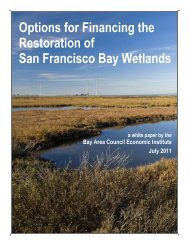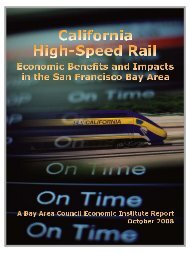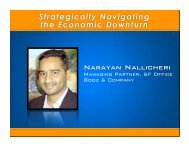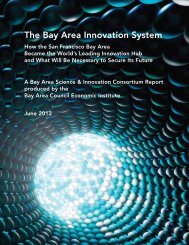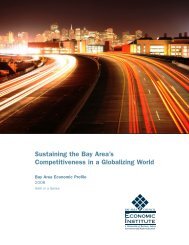Ties That Bind - Bay Area Council Economic Institute
Ties That Bind - Bay Area Council Economic Institute
Ties That Bind - Bay Area Council Economic Institute
You also want an ePaper? Increase the reach of your titles
YUMPU automatically turns print PDFs into web optimized ePapers that Google loves.
42<br />
<strong>Ties</strong> <strong>That</strong> <strong>Bind</strong><br />
Dr. George Koo is optimistic about U.S.-China relations, given the two countries’ influence in<br />
the world, the size and interdependence of their economies, and their common strategic interests<br />
in many areas. He recalls an early first trip to China in 1979, just after normalization. He needed<br />
a travel permit to leave Beijing. When he went out for a walk he was followed by a government<br />
handler. In a dilapidated hotel, he tried to set up appointments, but an antiquated phone system<br />
had a permanent busy signal during the first hour of the day because all offices opened at the<br />
same time, at 8:30. He could not deal directly with companies but instead was required to work<br />
through import-export intermediaries.<br />
Things have changed significantly since then. But he repeats the oft-quoted saying, “Everything<br />
is possible in China; nothing is easy,” and he sees constant potential for commercial, political and<br />
strategic misunderstanding.<br />
Dr. Koo, who is currently director of the Chinese Services Group at Deloitte & Touche, was<br />
recruited in 1978 from SRI International (formerly Stanford Research <strong>Institute</strong>) to do crossborder<br />
consulting for Chase Manhattan Bank’s Chase Pacific Trade Advisors—specifically, to<br />
help client firms enter the China market. He later founded Bear Stearns China Trade Advisors<br />
and worked with H&Q Technology Partners, then an affiliate of Hambrecht & Quist, before<br />
moving to Deloitte. Dr. Koo is currently on the board of Pacific News Service and served<br />
through April 2006 as vice chair of the Committee of 100 (C-100), a nationwide group of Chinese-American<br />
business, arts and community leaders (architect I.M. Pei and cellist Yo-Yo Ma are<br />
among the founders).<br />
C-100 was formed in 1990 to foster positive U.S.-China relations through communication and<br />
exchanges, and to enhance the image, visibility and participation of Chinese Americans within<br />
the U.S. It has commissioned nationwide surveys on American perceptions and attitudes regarding<br />
China; arranged high-level meetings with national leaders in Washington, China, Hong<br />
Kong and Taiwan; sponsored business and cultural delegations; pushed to expand classroom<br />
teaching about Asian-Americans and Asian history and culture; promoted PBS, Learning Channel<br />
and Discovery Channel documentaries on China; publicly supported Dr. Wen Ho Lee against<br />
federal spy charges; and actively lobbied U.S. policymakers on issues related to trade, industry<br />
outsourcing and globalization. In February 2004 it opened a “greater China” office in Hong<br />
Kong, and hosted its first annual greater China conference in January 2005—a companion event<br />
to its annual U.S. conference. In 2005 C-100 launched a national mentorship program for university<br />
students and young adults.<br />
The <strong>Bay</strong> <strong>Area</strong> has one of the largest concentrations of C-100 members in the U.S. Dr. Koo believes<br />
that the region enjoys a strong competitive advantage in terms of technological cooperation<br />
with greater China: “Silicon Valley is unique. It’s multicultural and multiethnic in a way that<br />
isn’t comparable in Seattle or Boston. There’s also a far greater acceptance of failure; venture<br />
capitalists will always give you credit for having tried and failed.”<br />
But he shares the concern of many C-100 members, that protectionist political debates over<br />
China’s perceived trade advantage in wages and exchange rates mask deeper problems in the U.S.<br />
economy that erode U.S. competitiveness. Among these are unsustainably high deficits, low



